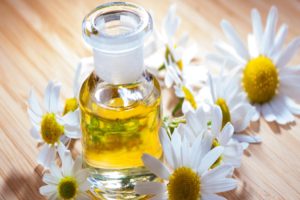Roman chamomile essential oil (Chammaemelum nobile or Anthemis nobilis) has been used throughout history for multiple purposes. Ancient Romans used the oil for mental clarity and courage during war. And it’s said to be nicknamed the “plant’s physician”, because it supposedly benefitted any nearby plants as well. Its aroma has a fruity-herby scent, somewhat sweet, and very calming.
Contents
Uses
While Roman Camomile oil is more calming and works as a better emenagogue, German Camomile oil is a very powerful anti-inflammatory agent due to the presence of a compound called Azulene.
Benefits
Sudorific & Febrifuge: As a sudorific, both varieties of camomile oil induce profuse perspiration, which helps to remove toxins and agents that cause infections while simultaneously cooling down the body and effectively providing relief from fever, thus serving as a Febrifuge.
Antiseptic, Antibiotic, Disinfectant, Bactericidal & Vermifuge: Both varieties have very good antiseptic and antibiotic properties which do not let biotic infections develop, which are those infections due to biotic factors such as bacteria and fungi. They also eliminate infections that are already present. These are good vermifuge agents as well, which kill all sorts of intestinal worms. If applied to the hair, it kills lice and mites, keeping the hair and scalp free from infections and damage.
Stimulant & Antidepressant: Both varieties have been seen to be very effective in fighting depression and for raising spirits. They eliminate feelings of sadness, depression, disappointment, and sluggishness while inducing a sort of happy or charged feeling. Even smelling these oils can help a lot in overcoming depression and bringing about a good mood.
Anti-inflammatory & Sedative: While Roman Camomile is found to be effective in calming down annoyance, anger and irritation, particularly in small children. The German variety, on the other hand, is found to be more effective on adults for curing inflammation, particularly when it is located in the digestive or urinary system. They also reduce blood pressure and curb the swelling of blood vessels.
Stomachic, Digestive, Hepatic, and Cholagogue: Being a stomachic, they tone up the stomach and ensure its proper function. They also promote the secretion of digestive juices into the stomach and facilitate digestion. Being Hepatic, which means being good for the liver, they ensure good health of the liver and the proper flow of bile from it. They are also considered Cholagogues, meaning that they increase the secretion of Hydrochloric Acid, bile and enzymes in the stomach, thereby promoting digestion.
Antirheumatic & Antiphlogistic: They cure dysfunctions of the circulatory system, stimulate circulation and detoxify the blood from toxins like uric acid, thereby helping to cure ailments like rheumatism and arthritis, which are caused due to improper circulation and accumulation of uric acid. These abilities classify them as good antiphlogistics, any agent which reduces swelling and edema.
Cicatrisant & Vulnerary: They are very popular in the world of cosmetics, since they diminish the scars, marks and spots on the skin and on the face, making them a cicatrisant. They both also protect wounds, cuts and bruises from becoming infected, therefore also serving as a vulnerary.
Analgesic & Antineuralgic: They both have analgesic properties as well and efficiently reduce pain in muscles and joints, headaches, sinuses, toothaches, and bone injuries. They are also very effective in relieving the severe pain of neuralgia by constricting the blood vessels that surround the ninth cranial nerve and relieving the pressure.
Carminative: They are very good at expelling gas from the intestines and stomach while also curbing additional gas formation. This also helps to relax the body and lower blood pressure. What is even more important is that the effect of the oil also eliminates the more serious risks of excess gas, such as the trapping of gas in the wind pipe, which can even be fatal.
Antispasmodic, Relaxant & Nervine: They calm almost all nervous disturbances or hyper-reactions which result in convulsions, spasms, nervousness, and loss of control over limbs. They are Nervine, that is, they keep the nerves and the nervous system in a state of good health and proper functioning.
Tonic: They are tonic in nature, meaning that they tone up the skin, muscles, and internal organs.
Cautions
There are no specific risks of using either of the oils that has been widely displayed, except that it should be avoided if someone has a direct allergy to camomile or to any other members of the Ragweed family, to which Camomile belongs.
Blending: Camomile Oil forms very pleasant blends with Bergamot, Clary Sage, Lavender, Jasmine, Geranium,Grapefruit, Tea Tree, Rose, Lemon, Lime and Ylang-Ylang Oil.
Interactions
No interactions are known.
Other names
n/a
References
Source: OrganicFacts, https://www.organicfacts.net/health-benefits/essential-oils/camomile-essential-oil.html
Sustainablebabysteps, http://www.sustainablebabysteps.com/roman-chamomile-essential-oil.html

